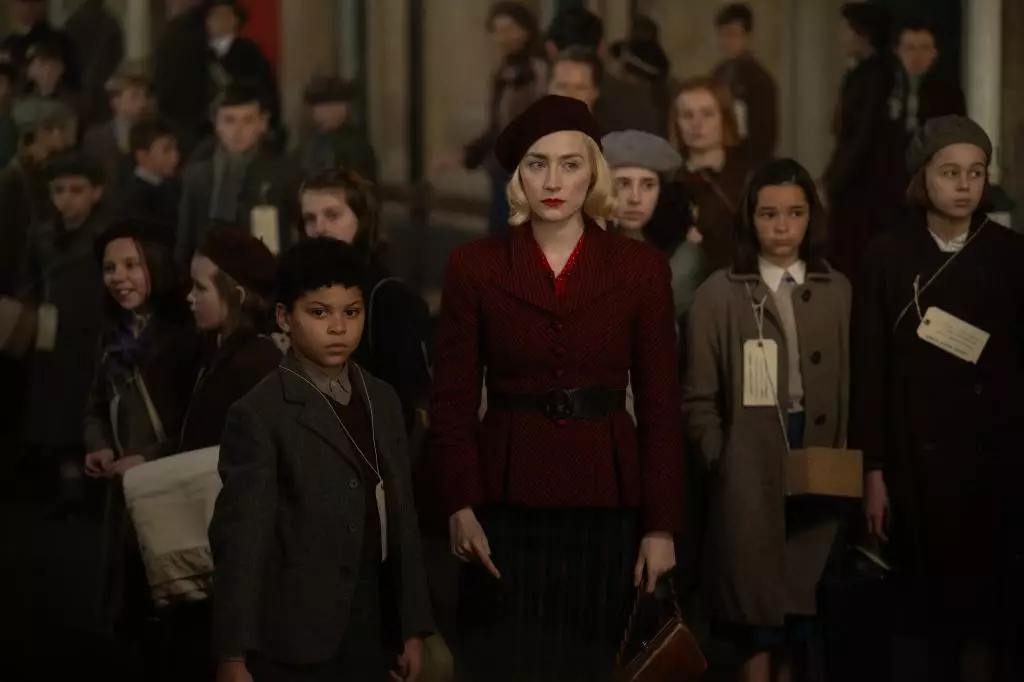Steve McQueen has made a name for himself as a director unafraid to delve into the darker recesses of human history. Following his extensive portrayal of the Nazi occupation in his documentary “Occupied City,” McQueen’s latest project, “Blitz,” provides a poignant narrative set against the terrifying backdrop of the London Blitz during World War II. This film, which premiered on the opening night of the London Film Festival and is set to debut in North America shortly thereafter, delivers a fresh perspective on a well-trodden historical narrative. By focusing on the journey of a young boy named George, played by newcomer Elliot Heffernan, McQueen encourages audiences to experience the raw realities of war through the eyes of innocence.
Central to the narrative is George, a biracial child thrust into a world marked by anxiety, violence, and uncertainty. As bombs rain down on London, George’s life is intricately complicated by his identity and the absence of his father, a theme that resonates with contemporary discussions around family structure and societal division. The opening scenes of the film take an artistic approach to depicting the horrific bombings, merging visual effects with the emotional weight of George’s experiences. Instead of graphic violence, McQueen chooses to show the bombings from a distance—a stylistic choice that reflects the fear permeating the London skyline.
George’s relationship with his mother, Rita, portrayed skillfully by Saoirse Ronan, serves as the emotional backbone of the narrative. Rita’s struggle as a munitions factory worker and mother sets the tone for many scenes as she battles her own fears while trying to protect her son. Their bond is palpable and serves to highlight the struggle of families during wartime—a topic often overshadowed by grand historical events. By humanizing this turmoil, McQueen draws audiences deeper into the individual stories that fueling broader historical narratives.
Childhood Despair and a Quest for Belonging
As George is sent away for safety only to find himself feeling like an outcast, the film layers its narrative with deep themes of belonging and survival. His journey is not simply a physical one back to London; it is also a search for identity in a world that largely excludes him because of his biracial heritage. The psychological impact of being bullied adds to his sense of isolation, making his subsequent escape from an evacuation train not just an act of survival but a desperate bid for connection and home.
McQueen artfully juxtaposes George’s flight from isolation with the backdrop of communal suffering. His encounters with fellow stowaways on a freight train amplify the theme of camaraderie born out of shared adversity. However, the grim reality of survival leads him into morally ambiguous situations, including a brush with a gang of looters—a moment that élucidates the complexity of human behavior in extreme circumstances. These encounters, reminiscent of Oliver Twist, highlight the harsh realities children often face during wartime, drawing parallels that resonate deeply with classic literature.
“Blitz” transcends the specific historical moment it depicts; it taps into contemporary narratives of conflict and resilience. The film’s release coincides with a global landscape rife with wars and humanitarian crises, eliciting a poignant reading of its final message. Through George’s eyes, audiences are prompted to consider the recurring themes of innocence lost, the consequences of war, and the resilience of the human spirit. Such reflections create a haunting mirror between present-day global conflicts and the experiences portrayed in the film.
McQueen’s visuals—bringing a crumbling London to life through stunning cinematography by Yorick Le Saux—serve not only to encapsulate the horror of the blitz but also to paint a vibrant picture of community life amid chaos. The balance between destruction and simple human pleasures is almost heartbreaking, underscoring the relentless human spirit. The vibrant scoring from Hans Zimmer heightens this narrative, blending a soundscape that evokes both hope and despair.
Ultimately, “Blitz” becomes more than a historical account; it transforms into a timeless exploration of what it means to be a child in a world marked by turmoil and division. While McQueen’s artistic choices elicit strong emotional responses, they also serve as a reminder that, despite the passage of time, the facets of fear, loss, and longing remain constant. The film implores viewers to acknowledge the past’s brutality while also reminding us of the ever-relevant conversations surrounding childhood, identity, and survival. As audiences are drawn into George’s world, the haunting echoes of history resound with an urgency that transcends the silver screen, challenging us to consider the impact of our actions in today’s world and the narratives we choose to remember.
